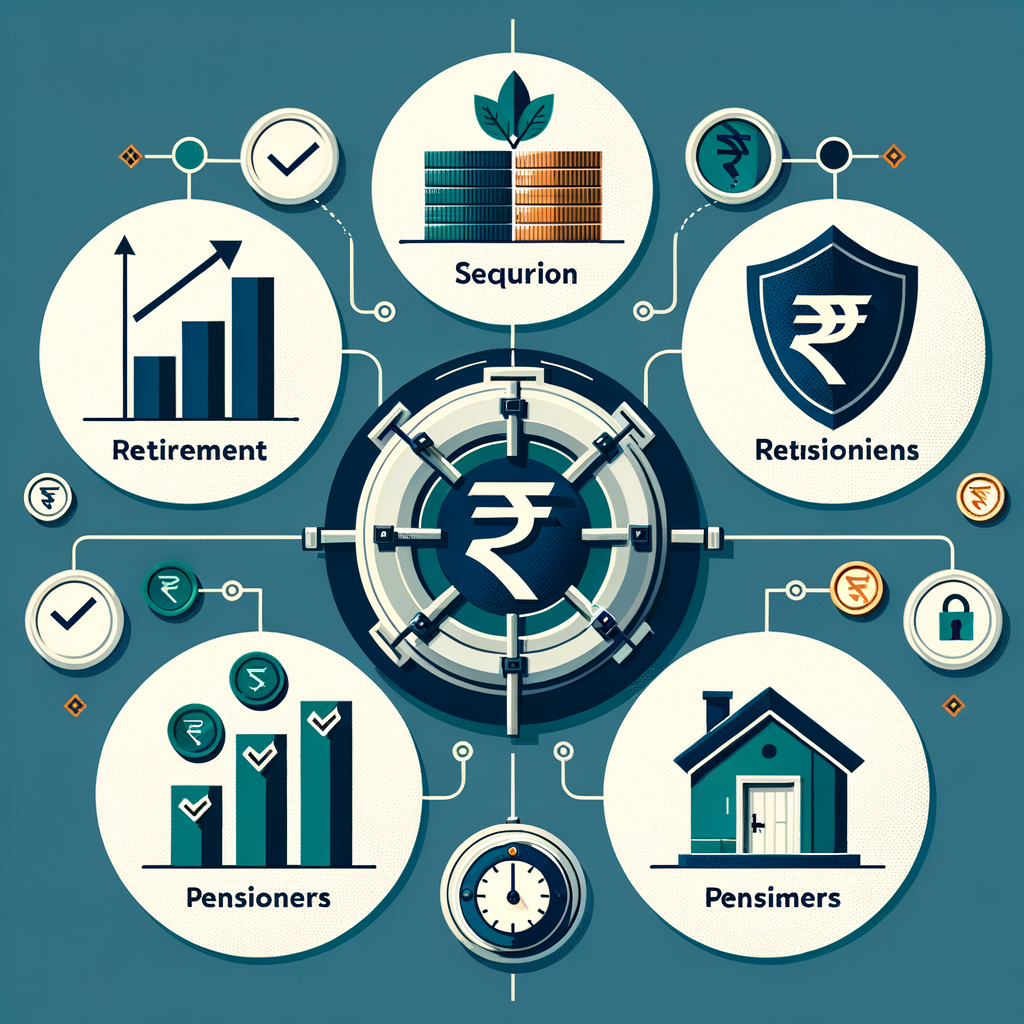Tax Planning for Retirement and Pensioners: Your Ultimate Guide to a Tax-Efficient Future
You’ve dedicated your life to working hard, saving diligently, and building a retirement corpus that can support you through your golden years. Now comes the most important part: ensuring you get to keep and enjoy as much of your hard-earned money as possible. This is where effective tax planning for retirement becomes not just a smart financial move, but an absolute necessity. Many people believe that tax planning is only for the ultra-wealthy or large corporations, but this couldn’t be further from the truth. For every salaried individual, business owner, and pensioner, understanding and implementing smart tax planning for retirement in India is the key to unlocking true financial freedom. This comprehensive guide will provide you with actionable retirement tax strategies in India, breaking down complex rules into simple steps and offering practical tips to help you manage your taxes effectively, whether you are nearing retirement or have already begun this new chapter of life.
Why You Can’t Ignore Tax Planning for Your Retirement
Thinking about taxes might not be as exciting as planning a post-retirement vacation, but its impact on your financial health is far more significant. Proactive planning isn’t a one-time task to be checked off; it’s an ongoing strategy that safeguards your future. Ignoring it can lead to a significant portion of your savings being lost to taxes, undermining the very security you worked so hard to build. A well-thought-out tax planning guide for retirees in India empowers you to take control, ensuring your financial resources work for you, not for the taxman. Let’s explore the tangible benefits of making tax planning a priority.
Maximizing Your In-Hand Retirement Income
The primary goal of retirement planning is to create a steady stream of income to replace your salary. This income can come from various sources like pensions, interest from fixed deposits, withdrawals from mutual funds, or rental income. Each of these income streams has different tax implications. By strategically planning your investments and withdrawals, you can significantly reduce your overall tax liability. Every rupee saved in tax is a rupee added to your disposable income. This means more money in your pocket for daily expenses, healthcare, travel, and pursuing hobbies, directly enhancing your quality of life during retirement.
Protecting Your Corpus from Inflation and Taxes
Two silent predators constantly threaten to erode your retirement savings: inflation and taxes. Inflation reduces the purchasing power of your money over time, meaning the ₹1 crore you have today will be worth much less in 10 or 20 years. When you add taxes to the equation, the erosion accelerates. For instance, if your fixed deposit earns 7% interest and inflation is at 6%, your real return is only 1%. If you then have to pay 30% tax on that 7% interest income, your post-tax return can actually become negative. Strategic tax planning helps you choose investment avenues that offer tax efficiency, such as tax-free bonds or equity instruments with long-term capital gains benefits, helping your corpus outpace inflation and grow meaningfully.
Ensuring a Stress-Free Retired Life
Retirement should be a period of peace and relaxation, not one filled with financial anxiety or fear of receiving a notice from the tax department. Proper tax planning provides immense peace of mind. By understanding your tax obligations, making timely investments in tax-saving instruments, and filing your income tax returns correctly, you can avoid last-minute scrambles and potential penalties. This includes knowing the specifics of Filing Income Tax Returns for Senior Citizens & Pensioners. Having a clear financial plan that incorporates tax efficiency allows you to be confident in your financial stability, freeing you to focus on what truly matters: your health, family, and personal pursuits.
Understanding Your Taxable Income After Retirement
One of the biggest shifts in your financial life after retirement is the change in your income sources. Your salary is replaced by pensions, investment returns, and withdrawals from your retirement funds. A common point of confusion for new retirees is figuring out which of these are taxable and to what extent. Let’s break down the primary sources of retirement income and their tax treatment.
Pension Income: Commuted vs. Uncommuted
Your pension is a key source of regular income, and it’s treated as “Income from Salary” for tax purposes. However, it’s crucial to understand the difference between its two components.
- Uncommuted Pension: This is the regular, periodic pension you receive every month. This amount is fully taxable in the hands of all employees, whether they are from the government or the private sector.
- Commuted Pension: This is a lump-sum amount you receive by forgoing a portion of your future monthly pension. The tax treatment for this lump-sum payment varies significantly.
| Employee Type | Gratuity Status | Tax Exemption on Commuted Pension |
|---|---|---|
| Government Employees | N/A | Fully Exempt from tax. |
| Non-Government Employees | Gratuity is also received | 1/3rd of the total pension is exempt. |
| Non-Government Employees | Gratuity is not received | 1/2 of the total pension is exempt. |
Gratuity and Leave Encashment
Gratuity and leave encashment are two lump-sum benefits often received at the time of retirement.
- Gratuity: This is a reward from your employer for your long service. For government employees, gratuity received is fully exempt from tax. For private-sector employees covered under the Payment of Gratuity Act, 1972, the amount exempt is the least of the following: a) the actual gratuity received, b) 15 days’ salary for each completed year of service, or c) ₹20 lakh. For detailed rules and calculations, you can refer to the official Income Tax India Website.
- Leave Encashment: This is the amount you receive in exchange for unutilized paid leave. If received upon retirement, it is fully tax-exempt for government employees. For non-government employees, there is an exemption subject to a limit of ₹25 lakh (as per Budget 2023).
Withdrawals from Provident Fund (PF) and NPS
Your retirement savings vehicles like EPF, PPF, and NPS have specific tax rules upon withdrawal.
- Employee Provident Fund (EPF): If you withdraw your EPF balance after completing 5 years of continuous service, the entire amount (both employee’s and employer’s contribution plus interest) is tax-free.
- Public Provident Fund (PPF): PPF is one of the most tax-friendly instruments. The maturity amount and the interest earned throughout the tenure are completely tax-exempt.
- National Pension System (NPS): At maturity (age 60), you can withdraw up to 60% of your NPS corpus as a lump sum, and this amount is fully tax-free. The remaining 40% must be used to purchase an annuity plan, and the pension received from this annuity is taxable as per your income tax slab.
Income from Investments
After retirement, income from your investments becomes a major financial lifeline. Understanding its taxability is key to effective retirement income tax tips India. Interest earned from Bank Fixed Deposits (FDs) and the Senior Citizen Savings Scheme (SCSS) is fully taxable according to your applicable slab rate. Income from Post Office schemes like the Monthly Income Scheme (MIS) is also taxable. Furthermore, if you sell investments like mutual funds or shares, any profit you make is considered a capital gain and is taxed based on whether it’s short-term or long-term, with different rates applicable to equity and debt instruments. For a deeper dive into this topic, it is helpful to start by Understanding Capital Gains Tax in India.
Key Tax Benefits for Senior Citizens and Pensioners in India
The Indian Income Tax Act provides several special provisions and benefits to ease the tax burden on senior citizens. Being aware of these benefits is the cornerstone of pensioners tax planning in India. These provisions are designed to provide financial relief and acknowledge the contributions of our elderly.
The Advantage of a Higher Basic Exemption Limit
One of the most direct tax benefits for senior citizens India is a higher basic income threshold before any tax is levied. This means a larger portion of your income is tax-free from the start.
- For Senior Citizens (aged 60 to 80 years): The basic exemption limit is ₹3,00,000 per year.
- For Super Senior Citizens (aged 80 years and above): The basic exemption limit is even higher at ₹5,00,000 per year.
This is a significant advantage compared to the ₹2,50,000 limit for non-senior citizens.
Section 80TTB: A Major Deduction on Interest Income
This is perhaps the most valuable tax benefit specifically for pensioners. While non-senior citizens can claim a deduction of up to ₹10,000 on savings account interest under Section 80TTA, senior citizens get a much bigger benefit under Section 80TTB. Our guide on Section 80TTA vs. 80TTB: Deductions on Interest Income Explained breaks down the key differences. This section allows for a deduction of up to ₹50,000 on interest income earned from:
- Savings bank accounts
- Bank fixed deposits (FDs)
- Post office deposits
- Co-operative society bank deposits
This deduction directly reduces your taxable income, providing substantial savings for retirees who depend heavily on interest income.
Section 80D: Enhanced Deduction for Health Insurance
Healthcare costs tend to rise with age, making health insurance indispensable. The tax laws recognize this by offering a higher deduction limit for senior citizens under Section 80D for health insurance premiums paid. A senior citizen can claim a deduction of up to ₹50,000 for their health insurance premium. If they are also paying the premium for their senior citizen parents, they can claim an additional deduction of up to ₹50,000, bringing the total potential deduction to ₹1,00,000.
Exemption from Paying Advance Tax
Keeping track of quarterly advance tax payments can be a hassle. The law provides a welcome relief for senior citizens in this regard. A resident senior citizen who does not have any income under the head “Profits and gains of business or profession” is not required to pay advance tax. Their entire tax liability can be paid via Tax Deducted at Source (TDS) or as self-assessment tax before filing their income tax return.
Smart Tax Saving Options for Retired Individuals
Beyond utilizing specific senior citizen benefits, it’s crucial to continue investing strategically to reduce your tax outgo. Your investment focus might shift from aggressive growth to capital preservation and regular income, but tax efficiency remains paramount. Here are some of the best tax planning for pensioners and smart tax saving options for retired individuals.
Senior Citizen Savings Scheme (SCSS)
SCSS is a government-backed savings scheme designed exclusively for individuals above 60 years. It is one of the most popular and safest investment options for retirees.
- Safety: Being a government scheme, it offers the highest level of capital safety.
- Regular Income: It provides interest payouts on a quarterly basis, ensuring a steady cash flow.
- Tax Benefit: The investment made in SCSS (up to ₹1.5 lakh per year) qualifies for deduction under Section 80C of the Income Tax Act. However, the interest earned is fully taxable.
Pradhan Mantri Vaya Vandana Yojana (PMVVY)
Managed by the Life Insurance Corporation (LIC), the PMVVY is another government-backed pension scheme that provides a guaranteed pension for 10 years. It’s an excellent choice for retirees seeking a fixed, regular income to cover their monthly expenses. While the investment does not qualify for an 80C deduction, it offers a secure and predictable return, making it a stable component of a retirement portfolio. The pension received is taxable as per your slab rate.
Tax-Free Bonds and Debt Mutual Funds
For retirees in the 20% or 30% tax bracket, minimizing tax on interest income is critical.
- Tax-Free Bonds: These are issued by government-backed entities like NHAI, REC, and PFC. The interest earned from these bonds is completely tax-free, making them an outstanding option for generating tax-efficient income. Though they are not always available for subscription, they can be purchased from the secondary market.
- Debt Mutual Funds: For long-term goals (holding period over 3 years), debt funds offer a significant tax advantage over traditional FDs. The long-term capital gains from debt funds are taxed at 20% after indexation. Indexation adjusts the purchase price for inflation, which substantially reduces the taxable gain and, consequently, the tax payable. This results in much higher post-tax returns compared to FDs where the entire interest is taxed at your slab rate.
Continuing with Section 80C Investments
The end of your professional career doesn’t mean the end of Section 80C benefits. You can and should continue to use the ₹1.5 lakh deduction limit to lower your taxable income. For retirees, some of the most suitable 80C options include:
- Senior Citizen Savings Scheme (SCSS): As mentioned earlier, this is a top choice.
- 5-Year Tax-Saver Fixed Deposits: Banks offer special FDs with a lock-in period of 5 years that qualify for the 80C deduction.
- National Savings Certificate (NSC): A safe, fixed-income instrument from the post office.
- Life Insurance Premiums: If you have an existing policy, the premiums paid continue to be eligible for deduction.
Conclusion
Retirement marks the beginning of a new journey, one that should be defined by peace, security, and financial independence. Proactive and continuous tax planning for retirement is the bedrock upon which this security is built. It’s not a complex code reserved for experts but a series of logical steps that anyone can take. By understanding your taxable income sources, diligently maximizing the special tax benefits available to senior citizens like the higher basic exemption and Section 80TTB, and choosing the right tax saving options for retired individuals, you can protect your life’s savings from being eroded by taxes. This ensures that the corpus you worked so hard to build lasts throughout your lifetime and supports the lifestyle you desire.
Feeling overwhelmed? A well-structured retirement plan needs personalized attention. Let TaxRobo’s experts help you with your tax planning for retirement. Contact us today for a consultation and step into your golden years with confidence!
FAQ Section
Q1: Is the entire pension I receive taxable?
Answer: No. Your monthly (uncommuted) pension is fully taxable. However, the lump-sum (commuted) portion of your pension is partially or fully exempt from tax, depending on whether you are a government or non-government employee.
Q2: What is the biggest tax advantage for pensioners in India?
Answer: One of the most significant tax benefits for senior citizens is the deduction under Section 80TTB, which allows a tax deduction of up to ₹50,000 on interest income from bank and post office deposits. This is a direct benefit for pensioners who rely on interest income.
Q3: As a retiree, can I still invest under Section 80C?
Answer: Absolutely. You can still claim deductions up to ₹1.5 lakh under Section 80C by investing in eligible options like the Senior Citizen Savings Scheme (SCSS), 5-year tax-saving fixed deposits, National Savings Certificates (NSC), and even life insurance premiums.
Q4: Do I need to file an ITR if my total income is below the exemption limit?
Answer: If your gross total income (before any deductions) is below the basic exemption limit (₹3 lakh for senior citizens), you are generally not required to file an Income Tax Return (ITR). However, it’s advisable to file a ‘Nil’ return to maintain a record and claim any TDS refunds. Consult a professional like TaxRobo for clarity on your specific situation.



